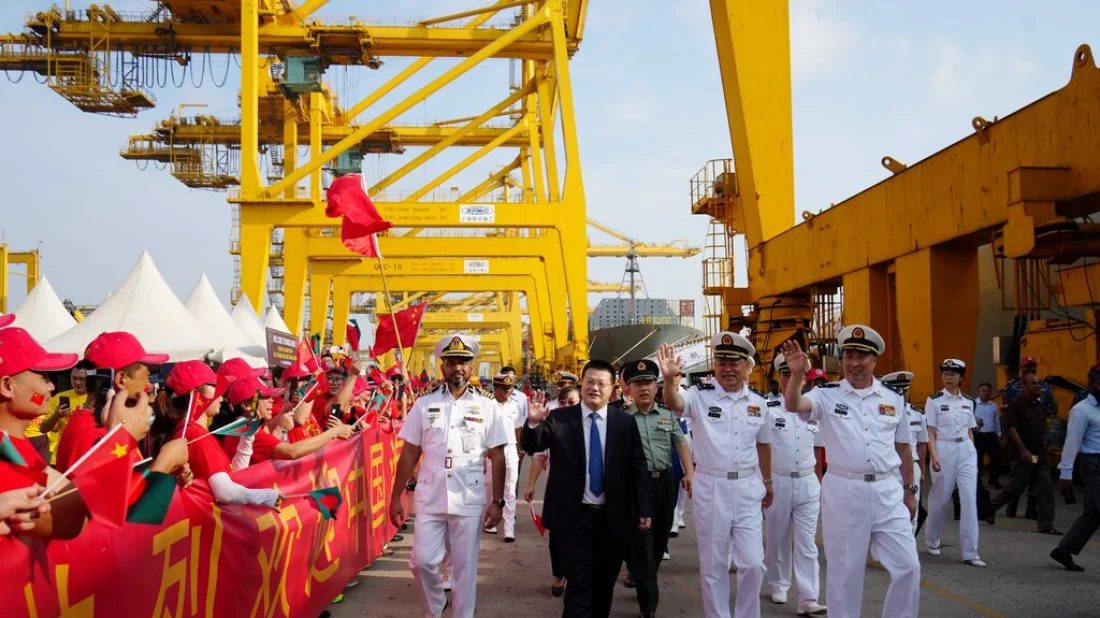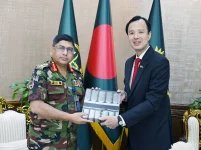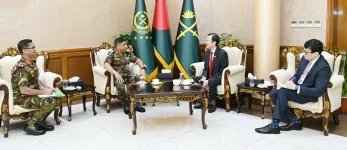Trump 2.0 and the future of Bangladesh-US defence relations
Former US President and President-elect Donald Trump attends a bilateral meeting with China's President Xi Jinping during the G20 leaders summit in Osaka, Japan on June 29, 2019. FILE PHOTO: REUTERS
Two months away from his second inauguration, Donald Trump aspires to be more protectionist to "Make America Great Again" this time. In his previous term, Trump declared the Indo-Pacific Strategy in 2019, citing this region as "the single most consequential region for America's future."
With the recent change in the administration in Bangladesh and the upcoming change in the United States, there is a growing need for reassessing the Bangladesh-US defence relations from a critical perspective. In the forthcoming years, the Indo-Pacific Strategy will be a key cornerstone for the US in engaging with Indo-Pacific nations. Hence, it has become imperative to look into and analyse what kind of defence ties may evolve between the two countries and why Bangladesh may face a dilemma while hedging between the US and China to maintain the ties under the second Trump presidency.
Before deep-diving into the defence dynamics, we must take a look at why Bangladesh is an inevitable player for the global powers in the region. Regarding the Indo-Pacific geopolitics, Bangladesh is deemed a strategic linchpin due to its crucial location that connects South Asia with Southeast Asia. Its geographic location in the heart of the Bay of Bengal region has turned it from a mere regional player to a vital strategic partner for major global powers—the US, the United Kingdom and Japan.
The Bay of Bengal holds a great strategic value as about half of the world's container traffic passes through this region, and its seaports handle around one-third of world trade. It is a major part of the Indian Ocean Region (IOR), which sees 80 percent of the global maritime oil shipments. A pronounced control over 118,813 square kilometres of the Bay, decisively affirmed through the rulings by the Permanent Court of Arbitration and the International Tribunal for the Law of the Sea (ITLOS), complements the significance accorded to Bangladesh as an inevitable player in the region.
Bangladesh's Indo-Pacific Outlook, unveiled in April 2023, echoes the country's nuanced approach to regional politics. The country champions an all-inclusive approach, accentuating regional cooperation and stability over strategic competition. Bangladesh is also projected to become a trillion-dollar economy by 2040, sitting at the intersection of major global markets with massive potential. Yet, per the World Bank data, it loses $1 billion annually due to tropical cyclones alone, and may lose one-third of its agricultural GDP by 2050 due to the impacts of climate change.
However, in the context of US-China rivalry in the region, the second Trump administration is expected to be more assertive. Analysts argue that among other issues, keeping China under pressure in the Indo-Pacific region will be one of the core geopolitical goals of Trump. In this respect, while evading the conflicts, Bangladesh must be cautious in stepping forward if it wants to exploit the geopolitical gains.
For five decades, Bangladesh and the US have enjoyed unfeigned defence relations and worked on a wide array of security issues, including maritime security, border security, counterterrorism, peacekeeping, defence purchase, and defence capability building. In recent times, the countries have developed a trustworthy relationship that is founded on shared values regarding a free and open Indo-Pacific. According to the US Department of State, Bangladesh has received $78.45 million in Foreign Military Financing (FMF) and $14.5 million in International Military Education and Training (IMET) assistance since 2014. With the US's assistance, Bangladesh has acquired patrol boats for its army, navy and coast guard, as well as mine-resistant ambush protected (MRAP) vehicles for international peacekeeping missions. In two phases, Bangladesh received 50 MRAPs under the Excess Defense Articles (EDA) programme in 2019 to provide additional safety to its peacekeeping troops in Mali. Additionally, the US Army delivered 46 additional MRAPs with 11 mine rollers to Bangladesh in 2021.
Bangladesh also received two Hamilton-class cutters previously owned by the US Coast Guard under the EDA programme in 2013 and 2015. These naval assets are playing a crucial role in providing security to Bangladesh's maritime territory and ensuring safe passage for foreign vessels. In FY2021, the US approved the permanent export of over $14 million in defence articles to Bangladesh under the Direct Commercial Sales (DCS) mechanism. The items include aircraft, assault rifles, military electronics, ground vehicles, and fire control, laser, imaging and guidance equipment for the military.
Under the Global Peace Operations Initiative (GPOI), the US has contributed nearly $44 million since 2005 to support training and equipment upgrades to improve Bangladesh's peacekeeping capabilities. Besides, the countries have been participating in security dialogues and joint exercises like Exercise Tiger Shark, CARAT, Exercise Shanti Doot, and Exercise Pacific Angel for years. These joint initiatives aim to expand partnerships in humanitarian and security aspects between the two countries and the region.
Despite numerous sectors of cooperation between Bangladesh and the US, there have been concerns regarding the former country's state of democracy and human rights during the Sheikh Hasina regime. However, Bangladesh has embarked on a new journey towards democracy and prosperity following the fall of the Hasina regime as the result of a student-led mass uprising in July 2024.
Conversely, the change in the US administration may corner Bangladesh to limit its military ties with China, which supplies most of its defence equipment. During Trump's first tenure, the US tried to use defence diplomacy to "woo" Bangladesh away from China. The US Secretary of Defence at the time, Mark Esper phoned former Prime Minister Sheikh Hasina, proposing to help modernise Bangladesh's military by 2030. The US offered Apache attack helicopters and missiles during that time. However, no major arms sales deal was formalised during Trump's first tenure. Bangladesh abandoned arms purchases from the US due to its stringent policies attached to arms use under the ACSA and GSOMIA agreements.
There is a strong possibility of the revival of talks between the two countries during the second Trump presidency, possibly including the signing of these agreements. However, Bangladesh may not opt for expensive US defence equipment to avoid increasing the burden on its plunging foreign exchange reserves.
The acquisition of two Hamilton-class cutters in 2013 and 2015 and the authorisation of over $14 million in defence articles to Bangladesh through DCS in FY2021 demonstrates the US's commitment to the military modernisation of Bangladesh. Yet, in the context of Indo-Pacific geopolitics, this defence rapport is palpable to be more complex in the coming days. Bangladesh's strategic hedging between the US and China has become increasingly precarious. Its hefty reliance on Chinese military equipment could be a ground of contention with the Trump administration, which is likely to be confrontational against China this time.
However, the success of future defence relations will widely depend on how these countries manage the competing priorities. For Bangladesh, upholding strategic autonomy while benefiting from US military cooperation without alienating China is going to be an arduous challenge. For the US, on the other hand, the challenge lies in offering attractive defence partnerships that acknowledge Bangladesh's strategic concerns and economic constraints.
Kawsar Uddin Mahmud is a researcher at KRF Center for Bangladesh and Global Affairs (CBGA).
Md Sakib Hossain is political and international relations analyst.

 Nurul Islam Hasib
Nurul Islam Hasib







































